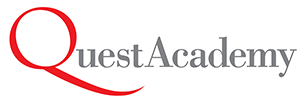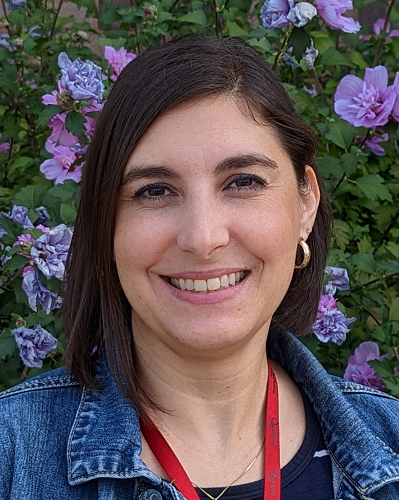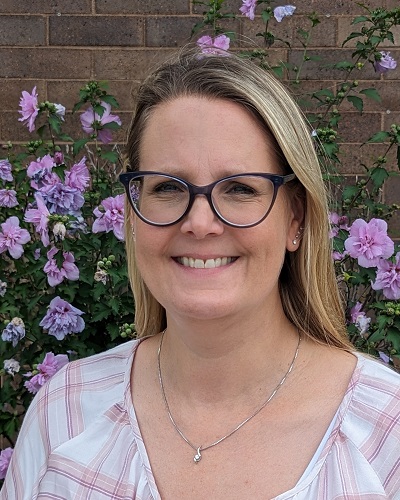5th Grade
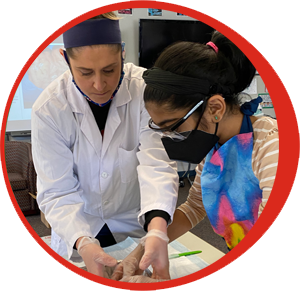
The Quest Approach to Fifth Grade
The fifth-grade teachers challenge advanced learners in a nurturing environment that is creative, innovative, and opportunistic. There is attention given to the smallest of details that lead to a happy place to learn. Both teachers believe that the valuing of the child, raising their self-confidence, and enhancing their love of learning are their main priorities.
Meet your Child’s Teacher
Both of your fifth-grade teachers are avid readers. On a daily basis, our passion for reading and learning will be part of the classroom dynamic. There is a focus on deeper reading and therefore deeper, richer understanding.

Darrell Maskell

Komi Shah
Homeroom
The Schedule
The teacher read alouds will be supported by technology. As the teacher reads, the children will engage with an interactive multimedia presentation. They will be able to make prereading predictions, ask questions, and will be given supportive information that allows connections to be made during reading. They will see pictures, read questions, and view video links related to the story. Children will be given opportunities to work in small groups (with the teacher) to discuss these read alouds at a deeper level and write written responses to profound questions.
The children will always be encouraged to read at home. Please remind us if your child is a reluctant reader [at home] and needs encouragement in this area. Both fifth-grade classrooms have an abundance of literature available. Please encourage your child to ask us for a book replacement to read at home. The students will have opportunities to participate in small-group book talks, where they can discuss the literature they are reading at home. The students will discuss reading strategies like questioning, summarizing, and inferring, analyze the plot and characters at a deeper level, and consider similarities and differences between the texts of other children. If the depth-of-understanding is not apparent, second and third draft reading will be encouraged.
Again, in smaller groups, the students will be given a chance to write written responses to literature. These will include questions from the read-alouds, books they are reading at home, and nonfiction social studies texts. These written responses will be modeled by the teachers. They will be given good and bad examples and will be shown how to make improvements with second and third draft reading, and the reviewing and editing process.
There will also be an emphasis on both teachers modeling the concept of listening. Gifted children like to talk and express their views about the world and understanding of deeper concepts. In the speaking and listening sessions, there will be a strong emphasis on [only] one speaker at a time. Students will be encouraged [by the teacher modeling] to truly engage with the speaker.
The fifth-grade teachers understand the importance of preparing students for reading-especially in challenging nonfiction texts. Students will need to be provided background information such as historical context, subject-specific vocabulary, and life experience (wisdom). These texts may include speeches and primary source documents.
Students study English vocabulary that has its roots in both the Latin and Greek languages. They will examine words from these ancient cultures and view them as members of families. The students will learn about their own English language by exploring the presence of both Latin.
The students will be given many opportunities to read nonfiction texts. Research skills will be modeled during every assignment and project.
In grammar, constructing the compound sentence building the complex sentence subject, object, reflexive, intensive, indefinite, relative, interrogative, reciprocal, and possessive pronouns
verbals (participles, gerunds, and infinitives) verbs (action, linking, and helping) subject/verb agreement number and person active and passive voice forms and tenses of verbs conjugating verbs possessive adjectives.
Language Arts consists of reading, writing, and speaking, supported by year-long studies of grammar and vocabulary. Word to sentence to paragraph to composition. This year in grammar, the fifth-grade students will have the opportunity to work as a whole-class or in smaller, differentiated groups with a teacher/student ratio of approximately 1/6.
Based on the works of renowned experts in gifted education, such as Michael Clay Thompson… Gifted children and poetry – expression Interdisciplinary, example – fantasy writing and book cover design using iPads…
Mr. Maskell’s fifth-grade math program allows a student to work at his or her own pace. It is challenging, differentiated, and cyclical. There will be a push to regularly revisit key concepts that increase the likelihood of mastery. Children will be given opportunities to use learned concepts to solve real-world problems. Students can compare their work with peers and mistakes will be valued as an opportunity for growth. There is an attempt to move away from [just] “getting the questions right.”
Each lesson is sixty minutes long and will start with a seven-minute, mental-math session. This allows the students to learn strategies (or tricks) for solving problems that would normally be completed with pencil and paper or a calculator. The students are able to learn from each other as they can share their methods with the rest of the group. The children then have ten to fifteen minutes to review and practice previously learned concepts that will increase in complexity as the year progresses. The students will be introduced to new concepts that will be interwoven in every topic thereafter. There will be many opportunities to discuss mathematics, analyze information, and draw conclusions. At various times throughout the year, the students will be given opportunities to work in team activities and use technology. There will be formal assessments at the end of each topic. The children will have homework most evenings and this must be returned the following school day.
Mr. Maskell pulls the fifth-grade math concepts, problems, resources, and assignments from a variety of sources designed to be both challenging and stimulating. On a daily basis, depending on student understanding, the curriculum is modified to meet the needs of each child.
Check this page in the coming weeks to learn how students are deepening their number sense, strengthening their conceptual framework of math, analyzing real-world scenarios, and solving problems.
Social Studies:
The fifth-grade social studies program moves beyond American history and focuses on the study of human society through:
- Culture
- Politics
- History
- Geography
Economics
Trimester 1 begins at the end of the American Revolution (studied in fourth grade), moving from the British North American colonies to the creation and development of the United States.
Trimester 2 examines westward expansion through the mid-1800s and finishes in 1865 with the conclusion of the American Civil War.
Trimester 3 examines how the birth of Ancient Rome began with a series of mud huts (known as Latium) and became one of the greatest empires known to mankind.
The main topics are:
From Colonies to Country (1812-1860)
American Civil War (1860-1865)
Ancient Rome (753 BC – 476 AD)
The larger themes (explored through American history, the ancient Roman empire, current world events, and thoughts about the future) are:
National Identity
Growth of a Nation
Power
Freedom
Westward Expansion
Economic Growth
Human Rights
Slavery
War and Peace
Char Ed, ethics, work habits, service learning: benefits of developing empathetic thinking, self-discipline, independence, unique program before MS… Throughout the year, the children will be studying the concept of ethics and how this is inextricably linked to artificial intelligence. These concepts will be developed in middle school. Like last year, the children will still study the Quest Character Traits mentioned above, but ethics will be woven into the curriculum. Students are encouraged to make their own judgments about whether something is right or wrong, good or bad – and to explain why using specific evidence and logical reasoning. The outline of the fifth-grade ethics curriculum is listed below.
Field Trips: Alumni often report that one highlight of their Quest experience was the fifth-grade trip to Galena, Illinois and Dubuque, Iowa. In late May, the fifth-graders travel by bus through the scenic countryside of western Illinois, arriving in historic downtown Galena. We spend two days enjoying educational sites such as the National Mississippi River Museum & Aquarium, Ullyses S. Grant’s home, Eagle Point Park, and an authentic 1897 shop with two working forges and a blacksmith!
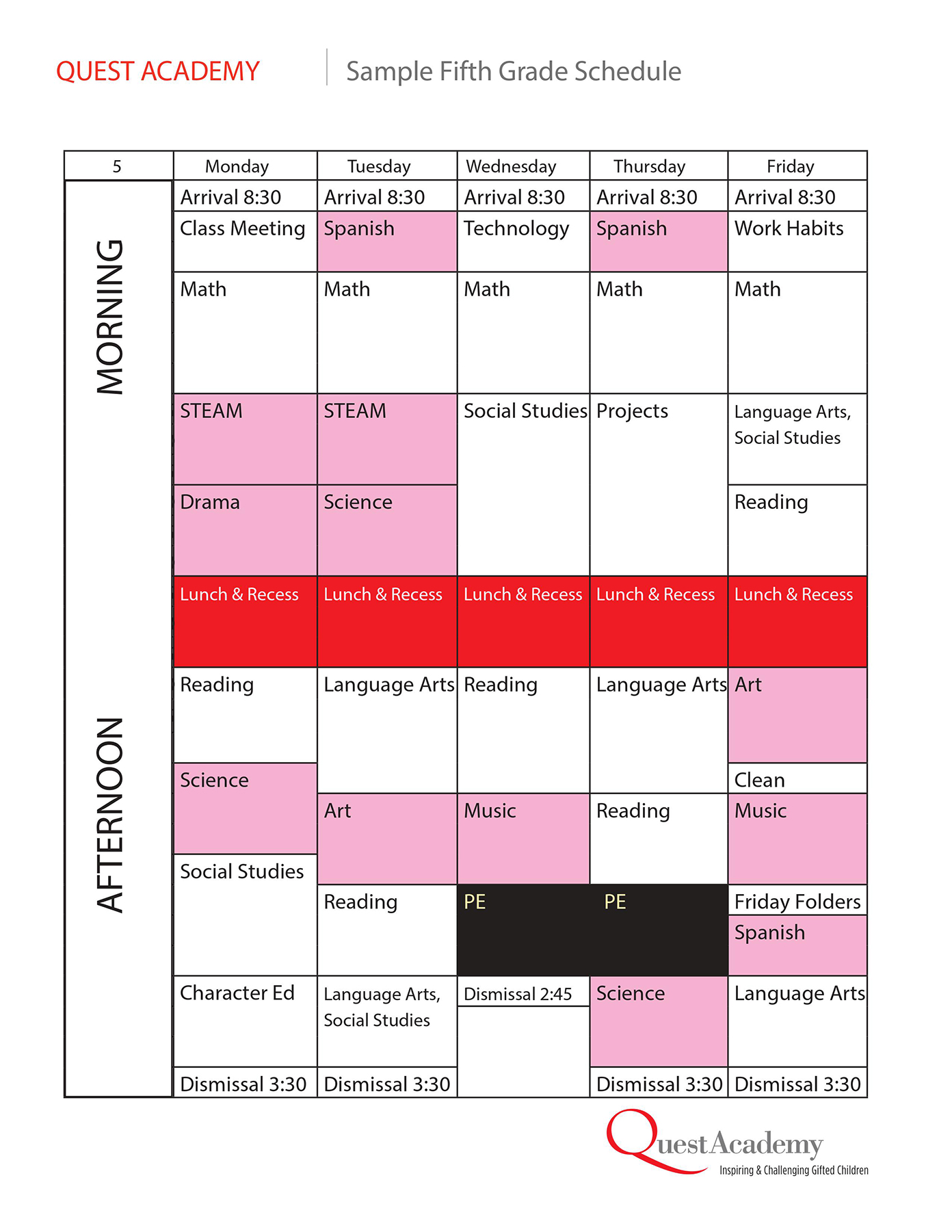
Quest Academy
Special subjects are taught by Subject Matter Experts
